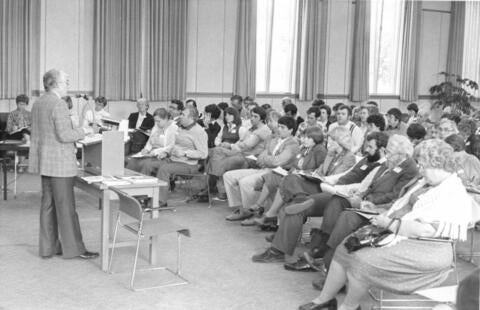In May 1999, at the kickoff of the Conflict Management Certificate Program, Rick Russel reflected on the Grebel logo, referencing the flames which to him represented the dynamic force of the ideas that Grebel has cultivated for years, unleashed and put into action in a world that sorely needs it (Grebel Now, July 1999).
For 60 years, Grebel has prioritized continuing education alongside its graduate and undergraduate teaching. Whether the “dynamic force of ideas” was in the form of workshops, lectures, forums, conferences, or music concerts—featuring faculty, students, or community partners—Grebel has sought to bring opportunities for personal growth and the exchange of new ideas within the community.
Conflict Management Certificate Program
In the mid-’90s, a visioning session of the Peace and Conflict Studies Department (PACS) recommended the implementation of a non-degree, skills-based certificate program in Conflict Management. This suggestion recognized rapid growth in Alternative Dispute Resolution (ADR), creating a demand for mediation services. The first workshop-based program was initially approved in 1999 on an experimental, one-year basis that required it to be a “cost recovery” project of the Institute of Peace and Conflict Studies.
In 2025 the program will celebrate 25 years of impact. The mission and vision of the Conflict Management Certificate Program is to provide practical, relevant skills training in conflict management, preparing participants to respond to conflicts in creative and positive ways. The program has seen 13,316 enrolments, offered 800 workshops, and celebrated 617 graduates, with ether a certificate in Conflict Management and Mediation or a certificate in Conflict Management and Congregational Leadership, the latter of which was introduced in 2008 to support clergy and lay leaders.
Rick Russell, a key contributor to the development and design of the Conflict Management Certificate Program, and Betty Pries, who joined as a regular instructor in 2001, have both significantly influenced the program. Betty’s doctoral thesis and subsequent book, The Space Between Us, continue to shape her contributions. Both Rick and Betty remain active as regular trainers in the program.
Community Justice Initiatives have partnered with the program for more than 20 years. Kay Pranis has brought her Peacemaking Circles work to Grebel annually since 2011, and several graduates of the program have been invited to become trainers. As PACS Director until 2017, Lowell Ewert guided the program’s growth while daily administration was managed over the past 25 years by Mary Lou Swartzentruber, Josie Winterfeld, and Susan Baker.
The program’s success led to the creation of a custom-designed training space as part of Grebel’s 2014 building project. During the pandemic, the program demonstrated its adaptability by transitioning to virtual workshop delivery, greatly expanding its geographic reach and paving the way for future delivery possibilities.
School of Adult Studies
Established soon after Grebel opened, the School of Adult Studies program operated for almost 20 years and engaged hundreds of participants each year. It offered a wide variety of programming that responded to the needs and interests of the Mennonite community.Offerings included a Parables Seminar, a church librarian workshop, a choral director’s workshop, a consultation on Historical Jesus Studies with Leander Keck, a “Sunday Evening Players” drama group led by Bertha Landers, and workshops for house churches

Ralph Lebold speaking at the school Adult Studies and Family Life Commison seminar " Helping Families that Hurt," October 1982. Mennonite Archival Image Database.
Anabaptist Learning Workshop
In partnership with Mennonite Church Eastern Canada (MCEC), Grebel established the Anabaptist Learning Workshop (ALW), a creative educational program that began in the fall of 2015 as another way to resource Mennonite churches. The purpose of this program was to offer an alternative education option for lay people, church leaders, pastors, seekers, new Canadians, and others. This five-year pilot project, funded by MCEC, created learning opportunities for those considering the intersection of Anabaptist-Christian faith and contemporary life.
During its existence, and under the leadership of Matthew Bailey-Dick (BA 2000), ALW offered more than 50 events covering topics that included: “How to Lead a Dynamic Bible Study,” “Prayer and Preparedness for Local Tragedies,” “Laypeople Doing Spiritual Care,” “Shacking Up: Love, Sex, and Church Commitment,” “Following Jesus Together While Having Very Different Beliefs,” and “Exploring Anabaptist Theology.” Leaders connected with more than 1600 participants for interactive, practical, and engaging learning within MCEC.
Grebel has historically been affiliated with additional adult learning programs, such as The Network: Interaction for Conflict Resolution—a teaching initiative on conflict dispute and resolution, week-long courses for seniors through Elderhostel, and educational programs run in collaboration with the Mennonite Historical Society of Ontario at the Brubacher House.
As Grebel continues to evolve, the College’s commitment to fostering education, creating opportunities for community engagement, and offering dynamic programming remains steadfast.

Anabaptist Learning Workshop participants in Hamilton, facilitated by Chris Brnjas and Jessica Reesor Rempel. 2016.






